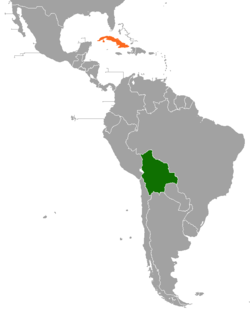Bolivia–Cuba relations refers to the diplomatic relations between Bolivia and Cuba. Both nations are members of the United Nations, but relations of Bolivia with Cuba, like those of most countries in the Western Hemisphere with the notable exceptions of Canada and Mexico, have waxed and waned over the decades depending on geopolitical and regional political circumstances. Relations were good under Evo Morales, who shared the position of his like-minded left-wing allies in Nicaragua and Venezuela that Fidel Castro was a humanist and beloved icon of resistance to US hegemony in the Americas.
 | |
Bolivia |
Cuba |
|---|---|
Rapprochement edit
Relations were established on January 11, 1983 under Bolivian President Hernán Siles Zuazo and Cuban President Fidel Castro after twenty years of no relations.[1] In 2013, relations were characterized as "excellent" by Cuban ambassador to Bolivia La Paz Rolando Gomez.[2]
Relations under Evo Morales edit
Following Evo Morales' rise to power in Bolivia in January 2006, Bolivia and Cuba became staunch allies and Bolivia joined the Cuba- and Venezuela-founded trade bloc ALBA. Bolivia became a long time recipient of aid from Cuba, especially Cuban medical internationalism.[3]
Post-Evo Morales edit
Following the ouster of Evo Morales in November 2019, relations between Bolivia and Cuba deteriorated as Bolivia's new interim president Jeanine Áñez sent 725 people (700 of them doctors) back to Cuba, accusing them of protesting against the new government.[4][5] The government of Jeanine Añez directly accused the Cuban actions to the relationship established by and through former minister and former ambassador Juan Ramón Quintana and also former minister Hugo Moldiz, who would have been the link for Cuban action[6][7] on Bolivian soil through the former Bolivian consul in Cuba, Jessica Suarez Mamani[8] and the secretary of Quintana, Natalia Rodriguez Blanco.[9]
On 15 November 2019, Foreign Minister Karen Longaric expelled 725 Cuban citizens, mostly medical doctors, after she raised concerns about their alleged involvement in protests.[10][11]
In January 2020, the interim government suspended relations with Cuba in response to remarks made by Bruno Rodríguez Parrilla, who called Áñez a "liar," "coupist" and "self-proclaimed" in reference to her latest statements about the role of Cuban medical doctors in the country.[12]
In October 2020, Luis Arce, who was finance minister in Morales's government, was elected President of Bolivia.[13] After his victory, Arce announced the restoration of ties with Cuba.[14]
References edit
- ^ Feinsilver, Julie M. (1993-10-28). Healing the Masses: Cuban Health Politics at Home and Abroad. University of California Press. pp. 174–. ISBN 9780520913950. Retrieved 28 February 2017.
- ^ Ietra, Tamaño (11 January 2013). "Cuba and Bolivia Mark 30th Anniversary of Diplomatic Relations". Cuban News Agency. Retrieved 28 February 2017.
- ^ Cross-continental Care: US and Cuban Medical Internationalism in Bolivia. 2015.
- ^ Ramos, Daniel (2019-11-16). "Bolivia blames Cubans for stirring unrest, ousts Venezuelan officials". Reuters. Retrieved 2020-05-28.
- ^ Frank, Marc (2019-11-16). "Cuba cries foul as doctors head home from Bolivia". Reuters. Retrieved 2020-05-28.
- ^ "Bolivia blames Cubans for stirring unrest, ousts Venezuelan officials". Reuters. 2019-11-16. Retrieved 2019-12-30.
- ^ "Bolivia cuts ties with Venezuela, orders Cuban doctors to leave". DW.COM. 15 November 2019. Retrieved 2019-12-30.
- ^ web, denis. "Embajada de Bolivia realiza Rendición Pública de Cuentas Gestión 2018 e inicial 2019". www.embajadadeboliviaencuba.org (in European Spanish). Archived from the original on 2019-12-30. Retrieved 2019-12-30.
- ^ "Acusan a extranjeros de dirigir movilizaciones en regiones del país". Los Tiempos (in Spanish). 2019-11-15. Retrieved 2019-12-30.
- ^ "La política internacional de Añez: anunció la salida de Bolivia del Alba, de la Unasur y rompió relaciones con Venezuela". Latinomerica Piensa (in Spanish). 15 November 2019.
- ^ Daniel Ramos; Gram Slattery (15 November 2019). "Bolivia blames Cubans for stirring unrest, ousts Venezuelan officials". Reuters.
- ^ "Bolivia suspends diplomatic relations with Cuba". La Razón (in Spanish). 24 January 2020. Archived from the original on 25 February 2020. Retrieved 5 March 2020.
- ^ "Bolivia: Socialist Luis Arce confirmed as outright presidential election winner". dw.com. 23 October 2020. Retrieved 21 January 2021.
- ^ "Arce diz que retomará relações da Bolívia com Cuba e Venezuela". noticias.r7.com (in Spanish). 20 October 2020. Retrieved 21 January 2021.